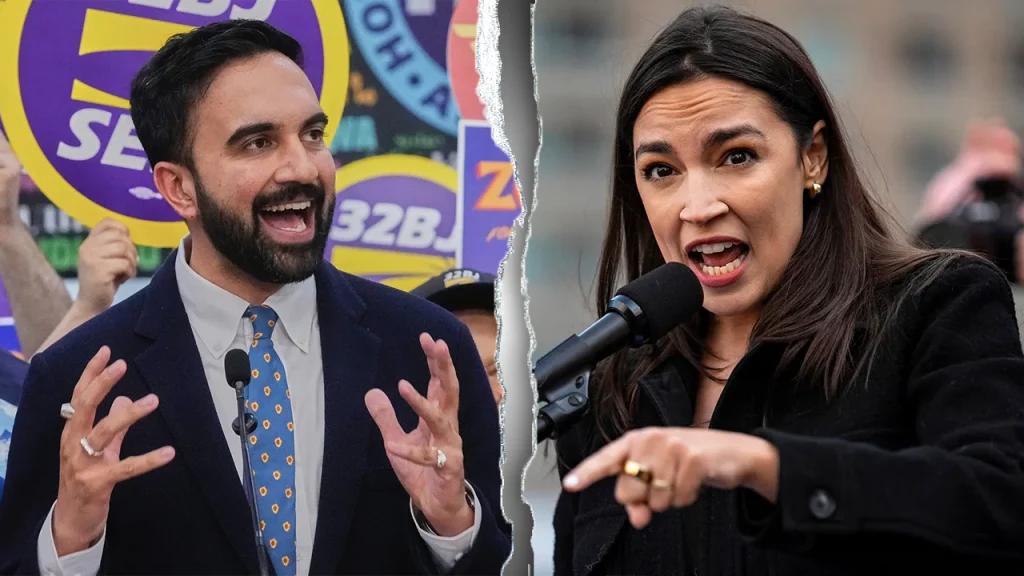Tensions Rise Over Roosevelt Avenue’s Future in NYC Mayoral Race
In the heart of Rep. Alexandria Ocasio-Cortez’s district lies a stretch of Roosevelt Avenue that has become ground zero in New York City’s mayoral race. This controversial strip, which spans neighborhoods like East Elmhurst, Corona, and Jackson Heights, has gained notoriety for rampant prostitution occurring in broad daylight, with the FBI designating it a priority target in their efforts to combat organized crime and sex trafficking. The area’s future has emerged as a flashpoint in the heated contest between Zohran Mamdani, who surprisingly won the Democratic primary, and his opponents, former Governor Andrew Cuomo and Republican nominee Curtis Sliwa. At the center of the debate is how the next mayor will address this troubled corridor that locals have sadly nicknamed a “red light district.”
The controversy intensified during a recent mayoral debate when Mamdani’s past support for decriminalizing prostitution came under fire from his opponents. As a state Assembly member, Mamdani co-sponsored “Cecilia’s Law,” which would have decriminalized certain prostitution offenses, and has publicly stated that “sex work is work.” While Mamdani has since tried to distance himself from these positions, insisting during the debate that “I have never called for the legalization of prostitution,” his critics remain unconvinced. Curtis Sliwa has been particularly vocal, warning that “there will be an expansion of this throughout the city if he should become mayor,” envisioning a New York where “open-air prostitution” thrives in residential neighborhoods, facilitated by “absentee landlords with pimps and madams, women who have been sex-trafficked into this country.”
Though a mayor cannot single-handedly change state laws on prostitution, the office holds significant influence over enforcement priorities and policing strategies. By appointing the NYPD commissioner and working with the City Council on local ordinances, the next mayor could substantially impact how authorities approach Roosevelt Avenue’s problems. Both Cuomo and Sliwa have positioned themselves as tough-on-crime candidates who would crack down on the sex trade, with Cuomo’s spokesperson stating the former governor “is firmly opposed to the decriminalization of prostitution” and would focus resources on prosecuting traffickers while supporting victims. Sliwa, meanwhile, has outlined a comprehensive plan that includes padlocking buildings used for prostitution, prosecuting pimps and landlords, and rooting out alleged NYPD corruption that he believes has enabled the brothels to operate.
The situation has real consequences for local residents, especially children and families who navigate these streets daily. Ramses Frias, a Democrat-turned-Republican City Council candidate who has protested the issue for years, painted a bleak picture of the community’s experience: “All you see is destruction, pain and suffering.” He noted that children walking to school regularly pass multiple brothels, with “10 to 15 prostitutes often standing outside” establishments that operate next to community spaces like a taekwondo school. This reality stands in stark contrast to the progressive vision of New York that many elected officials promote, with critics pointing out that Representative Ocasio-Cortez has been noticeably silent on the issue affecting her constituents. When Fox News Digital reached out for comment, neither Mamdani’s campaign nor Ocasio-Cortez’s office responded.
Adding another layer to this complex issue is the dispute over who bears responsibility for the current state of affairs. While Sliwa and Cuomo have positioned themselves as defenders of public order, Sliwa points out that Cuomo himself signed legislation repealing a law that criminalized loitering for prostitution—a measure co-sponsored by Mamdani. “Actually, Cuomo aided and abetted this effort by signing the legislation to do away with loitering laws, although he’s the first one to point fingers at Zohran Mamdani,” Sliwa argued. Cuomo’s spokesperson countered that the law “wasn’t credibly used to crack down on prostitution,” highlighting the nuanced policy disagreements that underlie the campaign rhetoric. These conflicting narratives reflect broader tensions in criminal justice reform, where efforts to protect vulnerable populations from discriminatory enforcement can sometimes clash with community demands for public safety and order.
Despite the political posturing, there are signs that law enforcement has begun addressing the situation. The NYPD reported that crime along Roosevelt Avenue has decreased by 34.7% year to date following the launch of Operation Roosevelt approximately a year ago. Police have made nearly 3,900 arrests in the area, with 549 specifically related to prostitution. “We’ve made significant progress addressing the community’s concerns,” an NYPD spokesperson told Fox News Digital. “Our officers will continue working every day to increase public safety and revitalize the neighborhood.” Similarly, FBI New York field office head Christopher Raia assured residents that agents are actively working in the area and to expect raids. As New York approaches its mayoral election, the future of Roosevelt Avenue hangs in the balance, representing not just a local quality-of-life issue but a symbol of the broader challenges facing the city as it navigates competing visions of public safety, criminal justice reform, and community well-being.


